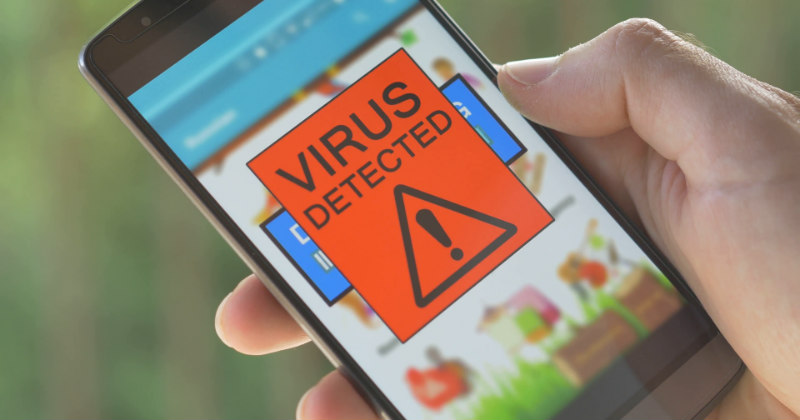Smartphone viruses are never as obvious as in the above photo, so how can you know if you have one? What are the main phone virus signs you should look for? And how can you prevent phone viruses in the first place?
You’ve often heard about computers becoming victims of malware. However, today, smartphones are equally vulnerable to malware and viruses. Often, viruses are used to take over your private information and accounts.
With the rising use of smartphones in every field, they’ve now become targets for hackers to access people’s personal data. Hackers’ latest malware is designed to break into your contacts, emails, apps and even online banking. But, can you really know if your phone has been affected by a virus?
The answer is, you surely can! If your smartphone has started behaving strangely and you don’t know why, then it could most likely be malware. To be sure, you can look for the signs that come along with a smartphone virus.
Phone virus signs you should recognize
Following are a few sure-fire signs that indicate a virus. If you notice these, it’s time to take action.
You see more and more pop-ups.
If you see an increasing number of pop-ups and ads on your phone, it could be a sign of adware or malware. In fact, pop-ups that just seem to appear out of nowhere with links to doubtful sites is an indication that you have downloaded an app with adware unknowingly.
Your data use suddenly rises.
Once a virus infects your phone, you will see a sharp hike in the use of data. This is because the virus uses the data source of the phone to either send information from your smartphone or to show ads.
Your bill has unexplained, unexpected charges.
Once a malicious virus affects your phone, it may be able to send texts and make calls to premium numbers, thus adding to your total bill.
So, if you see an unexpectedly high amount on your phone bill — especially because of text messages — try to figure out the cause by looking at your messages. You can even get in touch with your service provider to understand where the extra charges are coming from.
Your battery drains extremely fast.
Different malware and viruses can make use of your phone’s resources to further fuel the infection. So if you notice your battery draining quickly, then more often than not, it could be a sign of a virus.
You see messages and calls you don’t remember making.
Another way to know if your phone has a virus is if you see unexplained text messages and calls from your number. Viruses replicate and spread from one smartphone or device to another via emails and texts, and the like.
If your phone has been infected, then it might send weird messages to your contacts, most often containing a link. If your friends question you about such messages and you have absolutely no clue, then it could be because a virus has infected it.
Your phone lags or frequently overheats.
As mentioned earlier, when a virus infects your phone, it starts using the phone’s resources to spread. As a result, your phone is put under excess strain. So if your phone starts to slow down or heats up excessively even if you don’t use it much, then it could be a sign of a virus.
You see apps you don’t remember downloading.
This is probably the most common, but also the most overlooked, symptom of a virus. Viruses can often enter your smartphone with apps that you download. Viruses often accompany third-party apps that are downloaded from a source other than the Play Store.
Your phone can access the internet without you.
Viruses, as well as other malware, tend to use your phone’s data to spread. So, if you notice your phone switching on the data connections or wi-fi automatically without any intervention, then it could be because of a virus. Viruses tend to override your personal preferences and connect to the internet themselves.
Those are just some of the phone virus signs to watch out for. But how can you protect your phone from getting a virus?
How to prevent phone viruses — and other risks
One way to ensure your phone is safe from viruses is by using a VPN, or virtual private network. If you having trouble picking one. apps like vpnpro.com can help you out with their reviews, lists and VPN comparisons.
Regardless of where you are, a VPN helps to make your web sessions, financial transactions, and transmitted data more secure and protects your data online.
According to security experts, it’s best to avoid public wi-fi hotspots like the one available at airports and hotel lobbies. Such hotspots increase the risk of your privacy being invaded.
Similarly, internet service providers or ISPs might also invade your privacy by selling your browsing habits and preferences to advertisers. However, with a VPN, all these risks are greatly reduced. It keeps you safe from identity theft and makes it difficult for third parties to track you easily.





